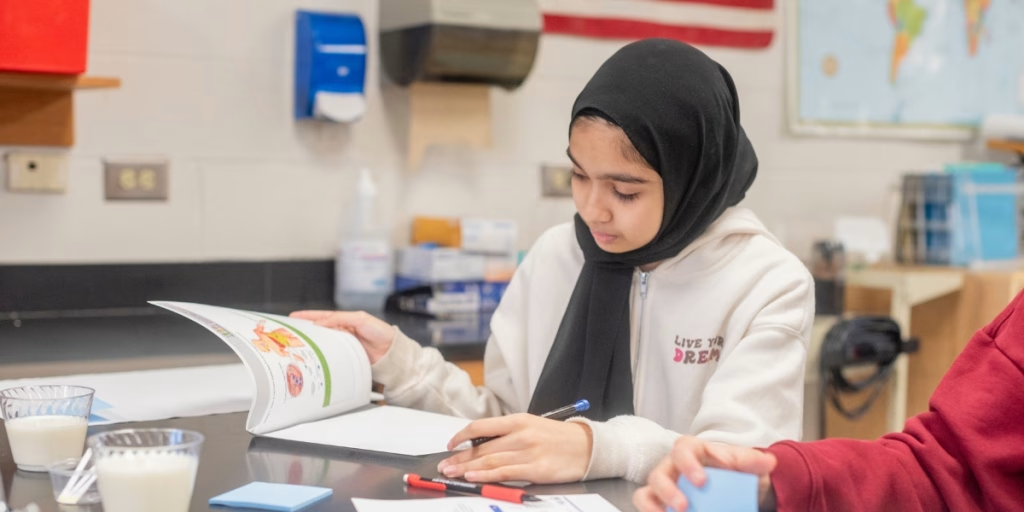Midwest Dairy focuses on Science, Technology, Engineering, and Mathematics (STEM) education, aiming to include dairy in school curricula. STEM is an educational approach that combines science, technology, engineering, and math to foster critical thinking and innovation. Over the next decade, the checkoff program aims to help students engage in discussions and understand scientific concepts related to dairy farming. In 2024, Dairy Checkoff published several new resources for high school science teachers, including life science curriculum units and assessments, all aligned with Next Gen Science Standards and available for free to educators. Keep reading to see how the STEM curriculum is being utilized across the 10-state region.
Illinois
Midwest Dairy partnered with the Illinois Agricultural Biology Curriculum Development Team (IABCDT) in 2024 to integrate dairy and agriculture into high school science classes, strengthening the perception of the dairy industry and its environmental sustainability role.
IABCDT included dairy in two of the six storylines they developed. The Milk Storyline explores the makeup of milk, dairy products, and cultural uses of dairy. A training for pilot teachers was scheduled for of February 2025. The Animal Nutrition Storyline focuses on ruminant nutrition, specifically cows, with an assessment of how farm animals use matter and energy. Fifteen pilot teachers have been trained for this storyline.
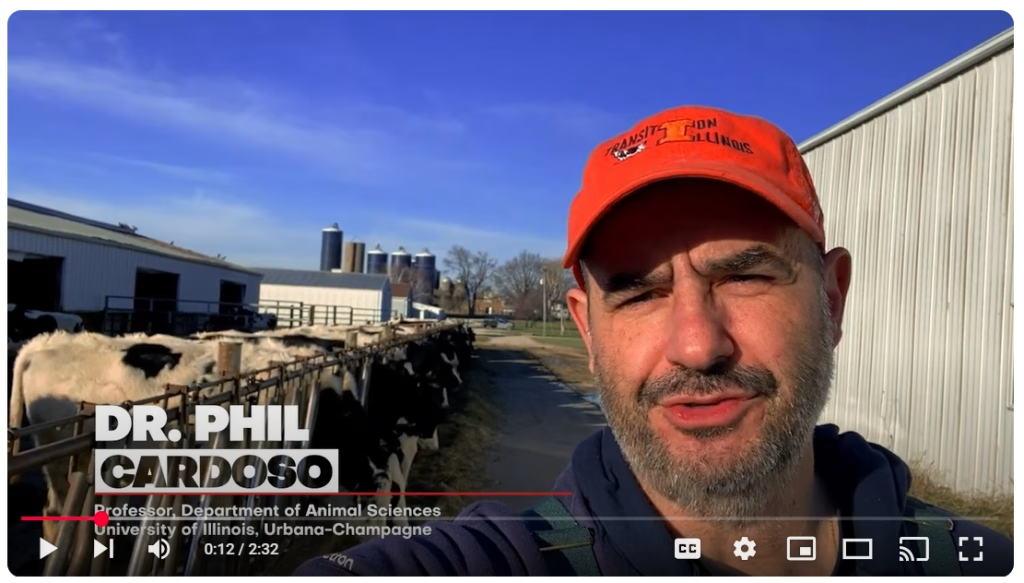
Midwest Dairy produced six videos for both storylines, covering topics like Milk Across the Species, Animal Diet Designers, Lactose Intolerance, Future of Dairy Technology, and Cow Comfort Chronicles. To ensure the videos were effective, Midwest Dairy partnered with various stakeholders, including Illinois dairy farms and nutrition experts.
Iowa
In summer 2024, STEM educators across Iowa explored agriculture through a partnership between Midwest Dairy and the Iowa Agriculture Literacy Foundation (IALF).
More than 200 educators participated in workshops held in eight Iowa communities. Each event involved a hands-on exploration of Iowa agriculture, including visits to local farms and agricultural businesses, in-depth discussions with agriculture experts, and interactive classroom activities to help students make real-world connections.
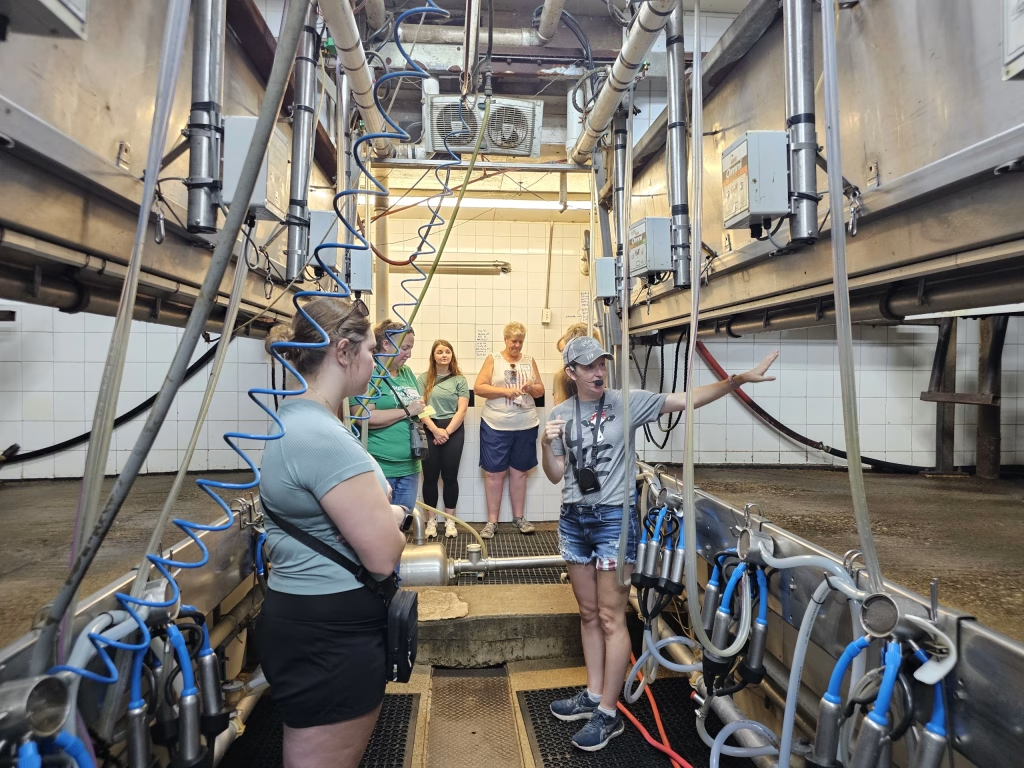
Teachers explored various agricultural topics, from crop farming to livestock production. They toured an Iowa dairy farm and learned about the production process and sustainability practices from local industry professionals. Workshops also included hands-on STEM activities that brought science to life. Educators reviewed Midwest Dairy STEM resources aligned with next-generation science standards and local topics. Each teacher made mozzarella cheese while learning about the science behind the cheese-making process.
Kansas
In late June, Midwest Dairy partnered with Smoky Hill Education Service Center to provide a professional learning opportunity for middle and high school science and career and technical education teachers in Salina, Kansas. This event helped educators deepen their understanding of the Next Generation Science Standards. Participants engaged in hands-on activities from the new STEM units and transfer tasks.
Dairy farmer Melissa Hildebrand Reed shared insights about her operation and walked the group through scientific tests conducted on her farm. Attendees valued the opportunity to learn from her and engage in discussions about dairy farming.
Participants actively discussed how to incorporate the activities into their classes and exchanged ideas with one another. Across the two half-day sessions, participants could earn eight professional development hours or up to three hours of college credit. Attendees appreciated the resources and training, with most saying that they would likely recommend this program to a friend or colleague.
Minnesota
Midwest Dairy partnered with the Minnesota State Science Teachers Association (MNSTA) in fall 2024 to showcase how food and agriculture concepts can be integrated into science education. This initiative included a webinar, newsletters, listserv updates, and two interactive sessions at the annual conference in St. Cloud. With Minnesota implementing the Next Generation Science Standards this school year, now is the perfect time to provide educators with access to new, free resources and training on STEM units, transfer tasks, and phenomena dairy checkoff developed.
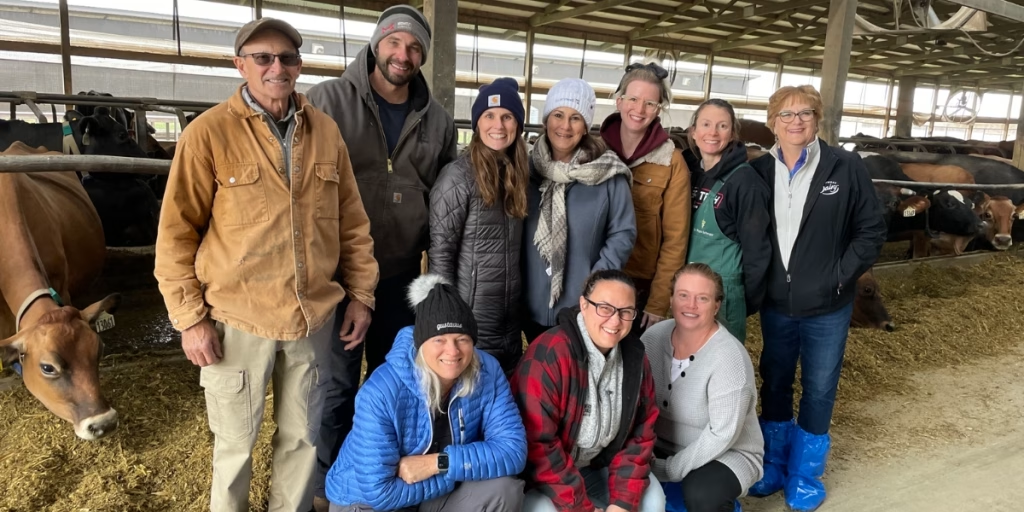
The October webinar “Food Totally Transfers” emphasized the importance of transfer tasks in connecting theoretical knowledge to real-world applications. Nine teachers attended, and the recorded session was shared with all.
Four email updates and two newsletters reached over 1,812 teachers. A vendor table with the Science Museum engaged over 60 attendees, who then participated in a drawing for three resource kits. Additionally, 14 teachers participated in the “Digestion Drama” workshop, acting out milk digestion and discussing ways to incorporate the activity into their classrooms.
Midwest Dairy also hosted a three-hour training session using the Media Mayhem curriculum. Teachers acted as students to explore media claims about the dairy industry’s environmental impact. Afterward, they toured a farm with NexGen Dairy, which provided insights on sustainability practices and animal care, having prepared with the lesson unit beforehand.
Missouri
This fall, Midwest Dairy partnered with Erin Snelling, a high school science teacher from Missouri, to present engaging, hands-on STEM activities at two major education conferences in the state. The Interface Conference, organized by the Missouri Department of Education, and the Science Teachers of Missouri (STOM) Conference allowed educators to explore new resources integrating dairy and real-world applications into their curricula.
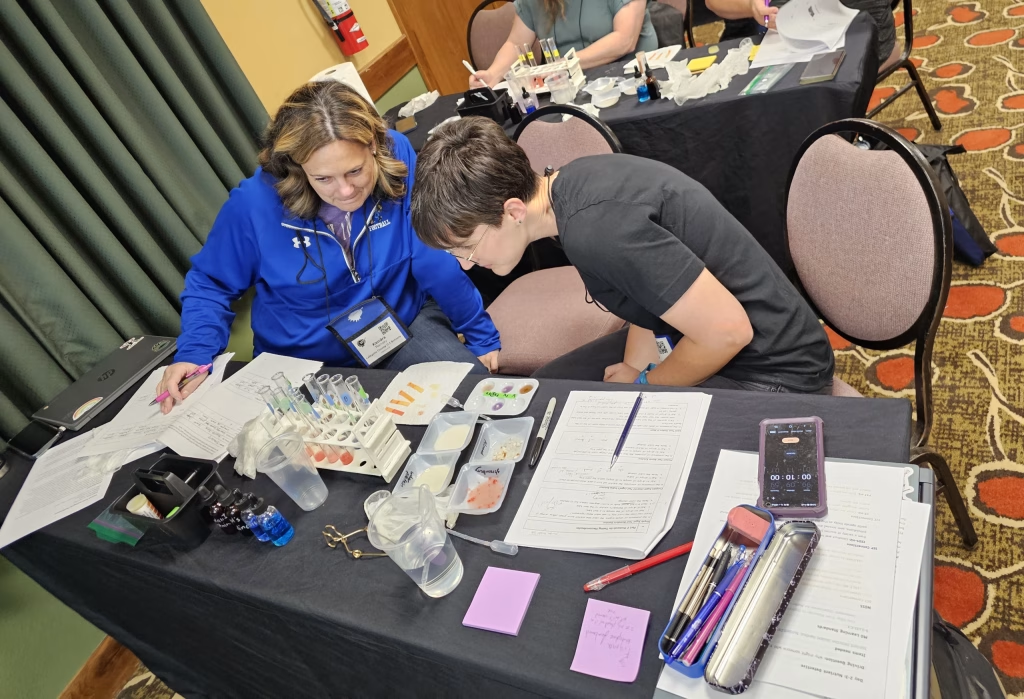
At the Interface Conference, Snelling led “Whey Protein Can Be Legen ‘Dairy”, a session designed for high school educators. This session focused on whey protein and its effects on exercise performance. Through interactive activities, participants addressed the question, “Why might someone who exercises consume whey protein?” Teachers left equipped with tools to incorporate this real-world concept into their classrooms.
Later, at the STOM Conference, Snelling presented the “Milk Digestion Science Theater” from dairy checkoff’s Post Game Analysis unit. This creative session invited teachers to act as “digestive organs,” “enzymes,” and “molecules,” allowing them to actively participate in simulating the process of milk digestion. In addition to the engaging presentations, Snelling introduced educators to new, free STEM resources from dairy checkoff at both conferences.
Nebraska
Midwest Dairy participated in a STEM workshop for Lincoln Public Schools (LPS) in late June 2024. The workshop occurred at Pound Middle School in Lincoln, Nebraska, and was attended by 12 science educators, three District Curriculum Specialists, and two student consultants. A seed grant funded this event, supporting an assessment task project with LPS. During the three-day collaboration, participants used dairy-funded tasks available on the Food and Agriculture Center website.
On the second day, Midwest Dairy introduced the dairy-focused STEM resources available to the science educators over a pizza lunch. The presentation emphasized transfer tasks, guiding the group through the “More Cheese, Please” transfer task experiment. Participants tested both 2% milk and lactose-free milk to determine the presence of glucose, which sparked engaging discussions and led into the lactose intolerance section of the task.
The educators expressed excitement about the dairy-focused resources and how they could access them. The sixth-grade team plans to implement the “More Cheese, Please” task, incorporating the workshop’s lab activity. The science teachers in attendance will be able to reach approximately 1,200 to 1,500 middle school students across their classes. This partnership will continue to provide support as needed and to monitor the effectiveness of the dairy-centered resources being utilized.
South Dakota
Midwest Dairy partnered with the South Dakota Science Teaching Association to offer local teachers a virtual professional development opportunity. This program showcased dairy-funded resources for STEM education that align with the Next Generation Science Standards. The training reached 27 high school science teachers and impacted approximately 2,000 students.
Teachers engaged in activities as if they were students, gaining firsthand knowledge and experience using these new resources. This experience aimed to inspire students and enrich curricula with valuable, real-world agricultural phenomena related to dairy production, sustainability, and nutrition. Additionally, participants received ten continuing education credits and a kit of supplies corresponding to one of the curriculum units. Midwest Dairy partnered with a local teacher and an education consultant to facilitate the training. One teacher remarked, “The learning activities and materials were engaging and left me with ideas I want to incorporate into my classroom.” This partnership has proven valuable in fostering relationships in STEM education in South Dakota while extending the reach and application of the new curriculum units.
